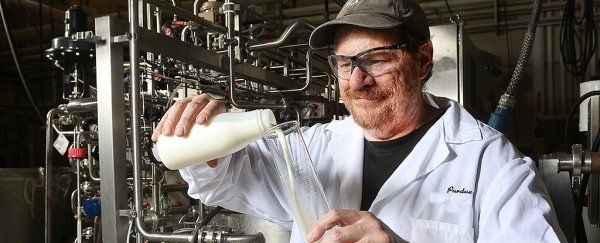You might not have to worry about milk going off in the future, with scientists announcing the development of a new technique that can keep it unspoilt for up to nine weeks.
With an 'add-on' to the regular pasteurisation process, the milk's temperature was increased by 10 degrees Celsius for one second, adding up to seven weeks to the usual lifespan of refrigerated, pasteurised milk (about two to three weeks).
The new process, developed by researchers at Purdue University in Indiana and the University of Tennessee, eliminates more than 99 percent of bacteria left behind after pasteurisation.
"With the treatment, you're taking out almost everything," says lead researcher Bruce Applegate from Purdue. "Whatever does survive is at such a low level that it takes much longer for it to multiply to a point at which it damages the quality of the milk."
You might already be familiar with pasteurisation, invented and named after French chemist Louis Pasteur, where milk is heated to kill off pathogenic bacteria that would otherwise make us ill.
Putting milk in the fridge helps to temporarily contain the stubborn bacteria that pasteurisation leaves behind, but of course the milk does eventually go off – although thanks to an extra burst of heat in this technique, that safe drinking window stays open for longer.
To develop the treated milk, the scientists put small droplets of pasteurised milk through a pressurised, heated chamber to quickly heat up the liquid by 10 degrees Celsius and then cool it down again (what's known as a low-temperature, short-time or LTST method).
Not only was the treated milk longer lasting and almost completely free of bacteria, but its colour, aroma, taste, and aftertaste were judged to be the same as regular pasteurised milk. Milk drinkers might never know the difference.
Another benefit of the system, which has been patented, is it requires the same amount of heat as the standard pasteurisation process, so it could be applied without making any extra energy demands.
The researchers say the process still needs to be perfected, but it looks like it could be scaled up without too much difficulty, although there's no timescale for when it might be available to consumers as yet. They also plan to test the technique out on raw, unpasteurised milk to see what the effects are.
And think of the knock-on effects too – not only would longer-lasting milk cut down on food wastage, but it could be transported further distances, which means fewer distribution locations, a more efficient network, and all the environmental benefits that brings. We can't wait for this milk to hit the shops.
The findings have been published in SpringerPlus.
